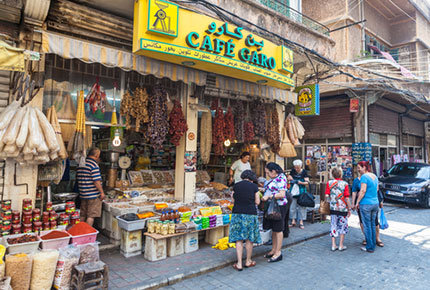The impact of the Syrian crisis on Lebanon’s agricultural sector and local consumption
Lebanon’s farmers and consumers adapt to war-driven changes in the marketplace.
According to industry experts, the ongoing Syrian civil war and the resulting refugee crisis have had both negative and positive consequences on the Lebanese agriculture sector.
One negative effect has had to do with the rise in the cost of shipping Lebanese agricultural products by land to Arab markets. “The deteriorating security situation on the Lebanese-Syrian borders has encouraged drivers to increase their shipping costs by land, prompting farmers to hike their prices in a bid to cover their expenses,” says head of the Lebanese Farmers’ Association Antoine Howayek.
Howayek further explains that this move by farmers in turn resulted in a reduced demand by Gulf countries for Lebanese food exports: “These items lost their competitiveness in the Gulf market, especially since the production cost in other neighboring countries is cheaper.”
Furthermore, there has been a drop in the consumption of Lebanese commodities by the Syrian population. “For instance, Lebanon used to export 90 percent of its banana crop to the Syrian market but this has fallen by over 50 percent since the beginning of the crisis,” Howayek says.
According to Ramiz Osseiran, head of the Farmers’ Association in the south of Lebanon, Syrians’ consumption of Lebanese produce dropped by around 70 percent due to the population’s lower purchasing power in the war ravaged country. “This could also be caused by the fact that a huge number of Syrians have left their country,” he adds.
Moreover, the arrival of more than a million Syrian refugees to Lebanon has driven down agricultural wages in the country due to the resulting surplus of labor. “Syrian immigrants compete with impoverished Lebanese over scarce jobs, driving down wages while increasing unemployment among local nationals,” says Hussein Zeaiter, assistant professor at LAU’s Department of Economics.
At the same time, the flow of Syrian refugees to Lebanon has not made a great difference in the domestic consumption of locally grown agricultural items, despite the substantial increase in the country’s population. Howayek attributes this phenomenon to the lack of protection by the government for the sector, and to the flow of cheaper products from neighboring countries to Lebanon. “We have a free market, and this allows merchants to import products that are already available in Lebanon at cheaper prices,” he says.
Alongside the many negative consequences of the Syrian war on local agriculture, Lebanon has seen some minor benefits from the situation. “Lebanese farmers have succeeded, for instance, in exporting their products to countries that were previously markets for war-wrecked Syria,” says Osseiran. He adds that Lebanon had the capacity to replace Syria in exporting potatoes, garlic and onions to other Arab markets, even if for a short period of time.
From a macroeconomic perspective, Walid Marrouch, assistant professor at LAU’s Department of Economics, explains that the agriculture sector — which accounts for around five percent of GDP — is not a big contributor to the national income in Lebanon. “Even if the Syrian crisis had a negative impact on agriculture, the macroeconomic impact on the Lebanese economy would be limited,” he says.
More
Latest Stories
- This Summer: Robotics and Artificial Intelligence Summer School for Middle Schoolers
- Into the Psychology of Justice
- Alumnus Zak Kassas on Navigation, Spoofing and the Future of GPS
- Hearing Between the Lines
- LAU Hematology Conference 2025: Advancing Science Through Interdisciplinary Exchange
- Dr. Chaouki T. Abdallah Invested as LAU’s 10th President
- LAU Guides Its Students Through the Code of Conduct
- Innovative Procedure at LAU Medical Center–Rizk Hospital Signals Hope for a Patient With a Congenital Disease


